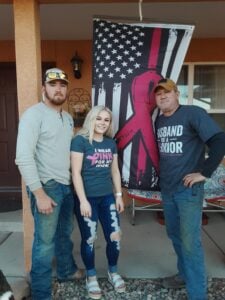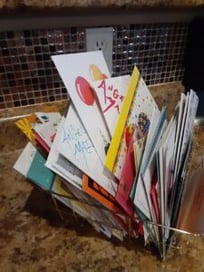44-Year-Old Mother of Three Diagnosed With Breast Cancer After Routine Mammogram
6 min read

Taking Time for an Annual Mammogram Proves to Be Lifesaving
Kimberly was 44 when she had her first mammogram and assumed it would be routine. In good health and with no family history of breast cancer and no symptoms, this was a logical assumption. But then one mammogram led to a second.
“I knew something was off even though I didn’t feel sick,” she says.
The mother of three from Canon City, Colorado, meant to start getting mammograms closer to age 40 but life had gotten in the way.
“I’m a mom. I was always doing mom things and not taking care of myself like I should,” she said.

The American Cancer Society recommends women begin screening at age 45 though women have the option to start screening with a mammogram every year starting at age 40 as part of routine cancer screenings.
After the second mammogram, Kimberly’s doctor ordered additional tests, many of which were delayed because of COVID lockdown or restrictions in her rural area.
“Next thing I know, I’m going to see a surgeon but I don’t even know why,” Kimberly recalls.
Finding Important Information and Support After A DCIS Breast Cancer Diagnosis
Kimberly was diagnosed with ductal carcinoma in situ (DCIS), which means abnormal cells were found in her milk ducts. While it’s generally non-invasive and rarely spreads outside the milk ducts, DCIS is considered to be breast cancer in its earliest stage.
Therefore, Kimberly’s small-town surgeon recommended a mastectomy but didn’t feel he could perform it. The DCIS was so widespread, “he said it looked like the Milky Way,” Kimberly describes. She went to Pueblo, where she had a double mastectomy. But it took two months to get the biopsy results.
“I couldn’t get calls back, I couldn’t get answers,” she explains. “I started using Dr. Google.”
Kimberly ended up turning to Facebook and finding a supportive group to help her through the unnerving cancer diagnosis and treatment process.
“There were 26,000 women with breast cancer. If I had questions, they would answer. They would share inspirational stories,” she said.
Not only did Kimberly find information and inspiration, she found products that would help make her experience more comfortable. She found the Blessing Box project that provides a mastectomy drain and a nesting pillow, which helps with post-surgery discomfort (and she still uses today).
Kim’s Experience in Treating HER-2+ Breast Cancer: From Dread to Delight
When the biopsy results came back, they revealed a tumor – the size of a pencil eraser – that was identified as HER2-positive (HER-2+) type breast cancer. Not long ago, HER2-positive cancer was considered somewhat of a death sentence, but advancements in cancer treatment have made it very treatable, often without chemotherapy.
Following her mastectomy, Kimberly was referred to Rocky Mountain Cancer Centers in Pueblo for chemotherapy. She recalls it as “the most devastating day of my life” – even more than the distressing steps she had already gone through in her breast cancer journey. “Because I thought everything was going to be okay, but then they told me I’d need chemo.”
Kimberly was worried about hair loss, about feeling sick, terrified of the long months of chemo infusions ahead of her.
“I remember driving to my first chemo full of dread,” she says about starting infusions at RMCC Pueblo. “And it was COVID, so my husband couldn’t come in with me. I walked in there terrified. Numb and scared.”
But, it turned out that she didn’t need to worry. Kimberly describes the RMCC nurses as “the most beautiful people I’ve ever met in my life. They have the biggest hearts. They sit and listen to you. They hold your hand.”
Kimberly grows tearful recalling the way her nurses supported her.
She describes her care team at RMCC, including her oncologist Dr. Radaideh, as “so compassionate. I have the direct email to my doctor’s nurse. She’s amazing, if I ever have a question. The nurses are fabulous, funny, and they really make you feel at home. It sounds awful, but I almost feel sad not to go, just because I’ll miss these pretty faces.”
In addition to emotional and medical support from RMCC, Kimberly also turned to online sources for help. She found a group, Chemo Angels, that provides resources for cancer patients and their families. And, in her case, she was connected with pen pals to cheer her on during the chemo treatment that she’d been so afraid of. “One was a breast cancer survivor. They sent me things every week: inspiration, funny stories.”
One month after starting chemo infusions, Kimberly celebrated her birthday.

“I probably got 100 birthday cards,” she says. “And I mean, I’m nobody. Everybody says ‘cancer survivors are warriors,’ but I’m not.
I just did what I had to to survive. But the people who helped me were amazing.”
Kimberly also cherished support from longtime girlfriends and her family. Her 20-year-old daughter frequently brought her flowers on chemo days, or made cookies.
And, lo and behold, Kimberly soldiered through the 12-week course of chemo treatment and is down to going once every three weeks. What was once terrifying is now part of her past, thanks to support she received from loved ones and strangers.
Speaking like the mom she is, Kimberly says, “It’s not the big things that matter.”
A lot of mothers will hear something familiar in Kimberly’s claim of being too busy “doing mom things” to stay on top of recommended cancer screenings. However, early detection is the most powerful weapon women have against breast cancer, regardless of how great the advances in cancer treatment are. Getting recommended mammograms, clinical breast exams, and, when appropriate, genetic counseling are not big things that take up a lot of time. But, like Kimberly says: It’s not the big things that matter.
Breast Cancer Resources in Colorado
Find out more about breast cancer screening and diagnosis.
For free breast cancer patient resources, visit the links below:
- Chemo Angels www.chemoangels.com
- Heal in Comfort www.healincomfort.com/free-resources-for-breast-cancer-patients
- Little Pink Houses of Hope www.littlepink.org
- The Gracie Foundation thegraciefoundationinc.org
- Breast Cancer, I Got This! Facebook Group
If you have been diagnosed with breast cancer and you’re looking for the same type of support and care that Kimberly received, request an appointment at the Rocky Mountain Cancer Centers location closest to you. Whether it’s your first consultation or you’d like a second opinion, our breast cancer specialists are ready to help you through.
